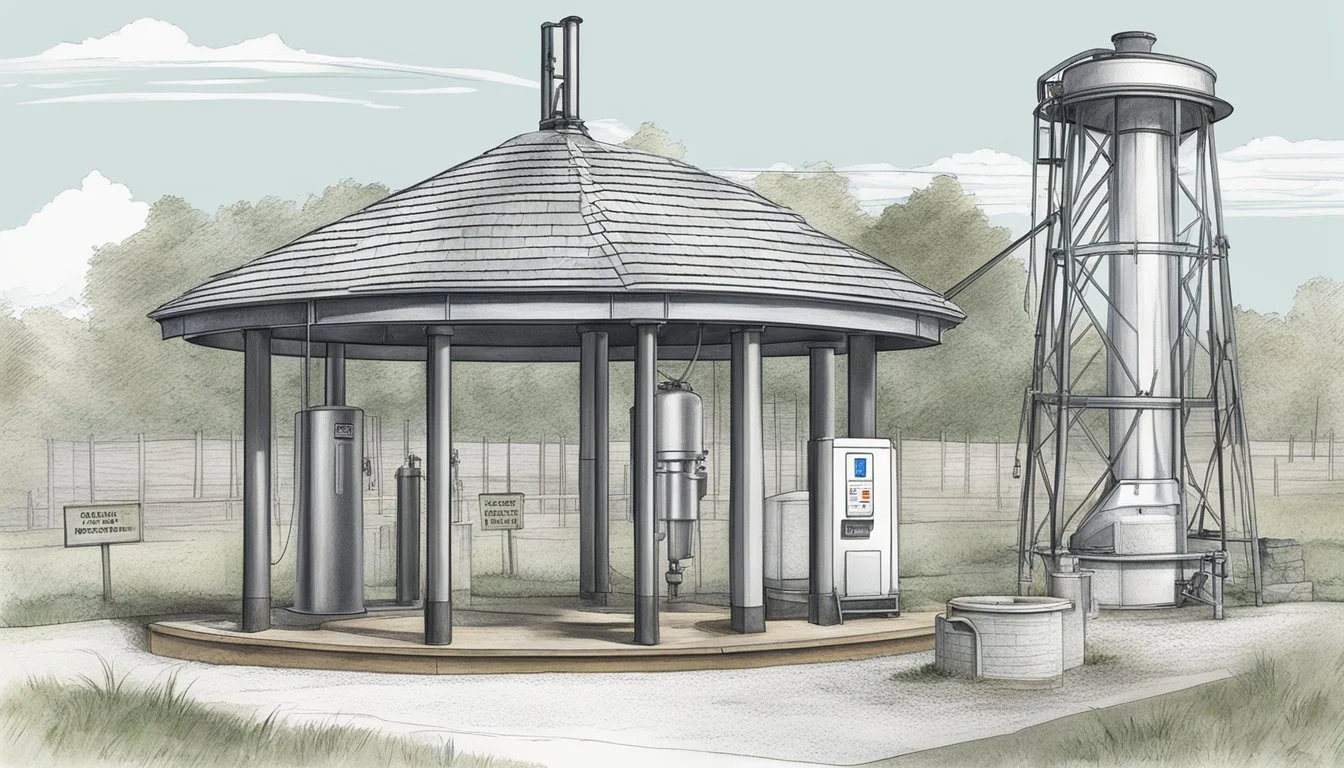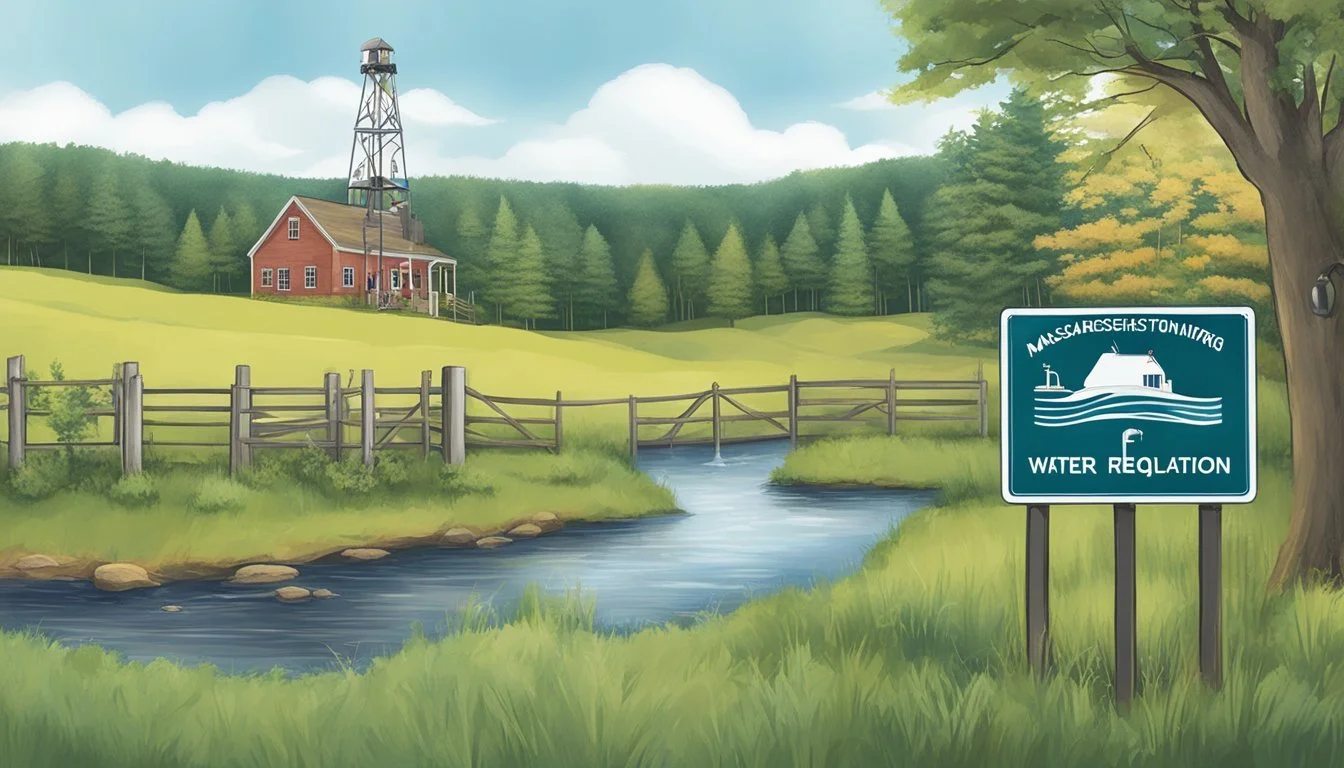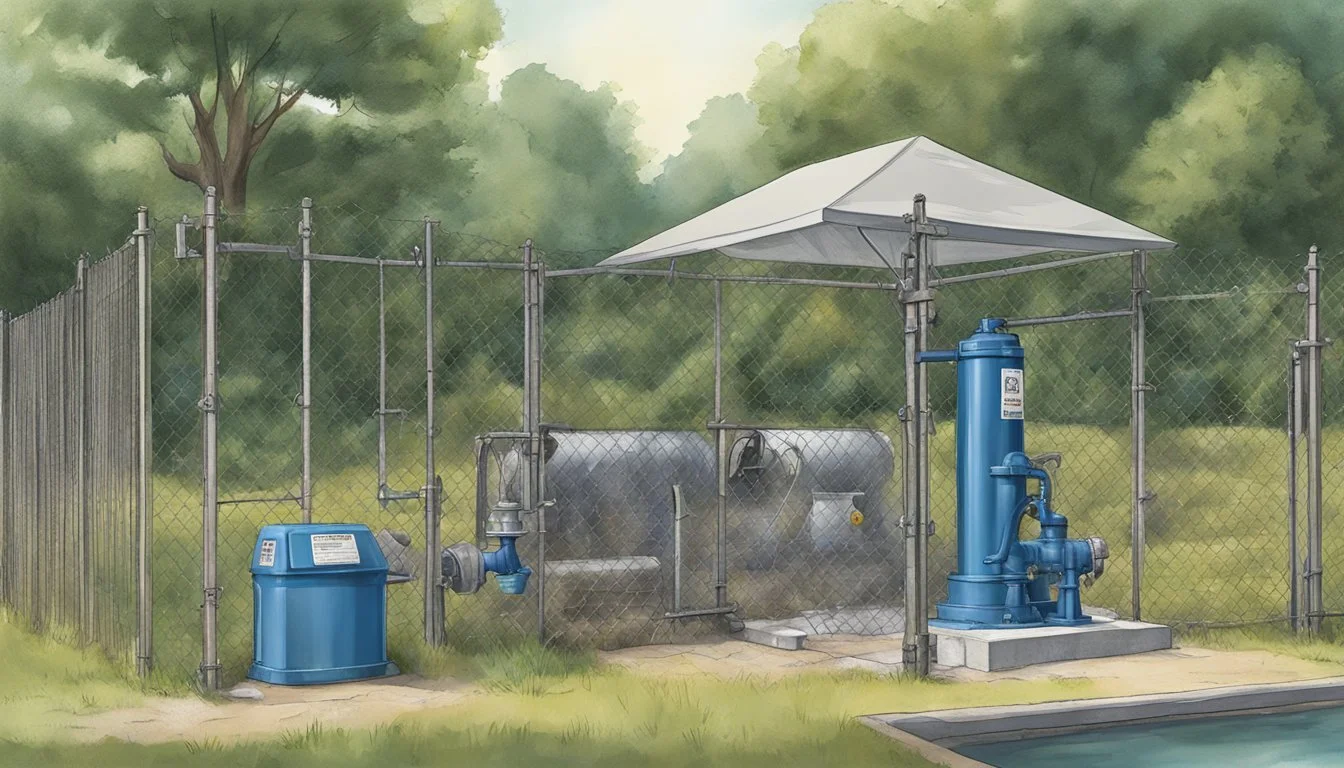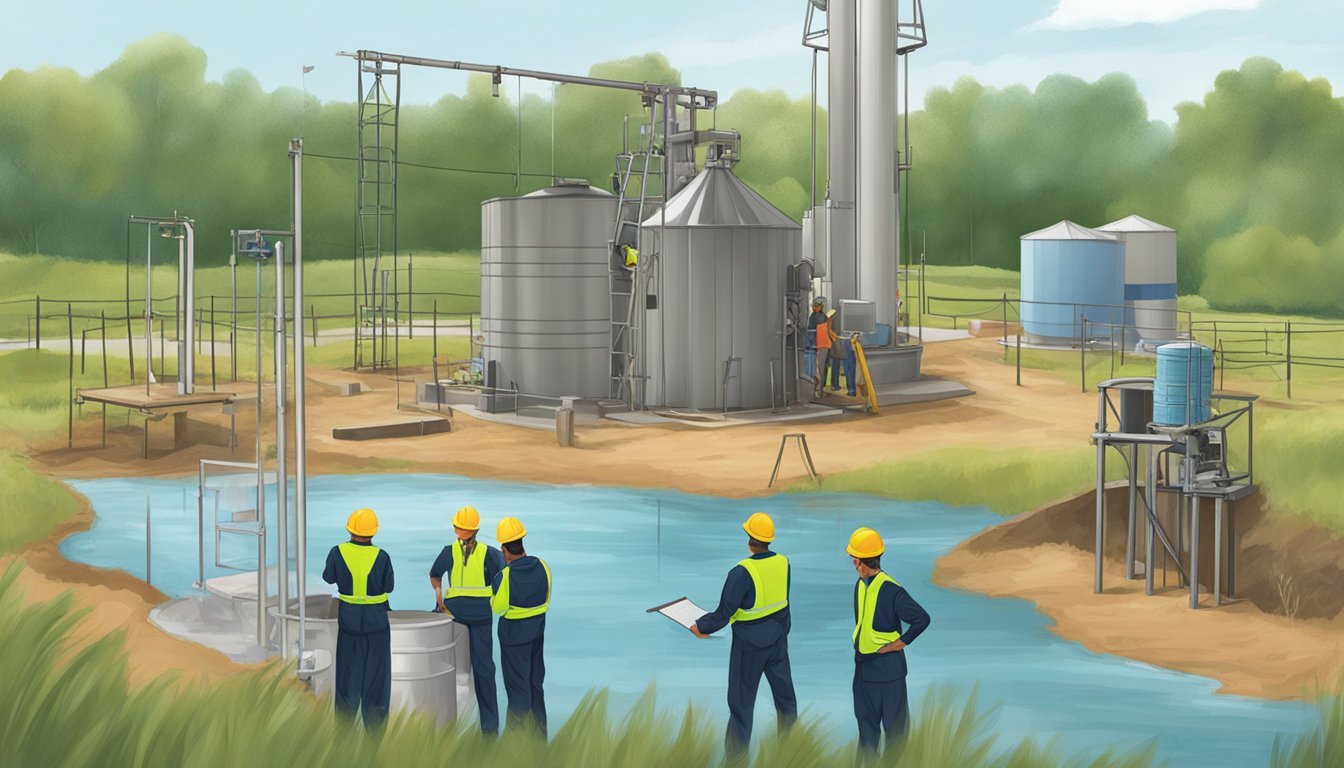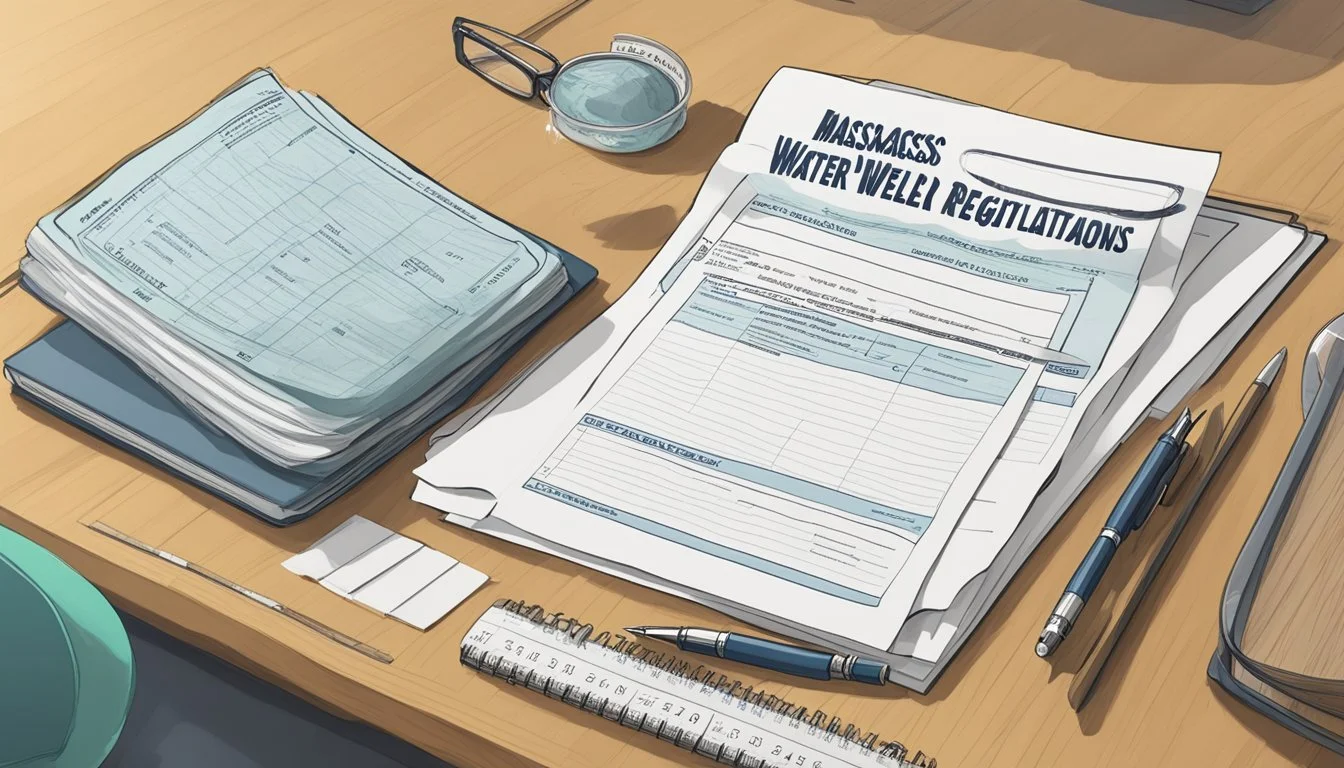Massachusetts Water Well Regulations
Understanding Compliance and Safety Standards
In Massachusetts, the management and regulation of water wells are essential to ensure the safety of the state's drinking water. The Commonwealth of Massachusetts has established comprehensive guidelines to regulate the siting, construction, maintenance, and testing of private wells. These regulations are designed to protect public health by ensuring that the water drawn from these wells meets safe drinking water standards. They apply to various types of wells, including those used for residential, irrigation, and industrial purposes.
The Massachusetts Department of Environmental Protection (MADEP) has set forth ground water protection criteria, which all new human consumption water wells must meet. In urban areas, private wells may also fall under the jurisdiction of local bylaws or regulations, which are enforced by the municipal Board of Health. These local entities work in conjunction with state regulations to oversee the proper functioning and monitoring of private wells.
Moreover, Massachusetts lawmakers have addressed the need for ongoing legislative updates to the existing water well guidelines. Bills have been proposed to ensure the continual adaptation of regulations in response to emerging environmental concerns and technological advances. These legislative efforts aim to expand programs such as the MassHousing Septic Repair Loan Program to encompass well testing, magnifying the state's commitment to public health protection.
Legal Framework
Massachusetts water well regulations are established under various chapters of the Massachusetts General Law and are designed to protect public health and the quality of groundwater. Key legal structures are as follows:
General Law: Provides a broad legal base for environmental protection and public health.
Chapter 1: Although not directly related to water wells, sets the precedent for the administrative and legal procedures in Massachusetts.
Chapter 11: This chapter does not specifically detail well regulations but outlines the state's auditing and oversight of public records, which can include water well records and compliance reports.
Chapter 111: Most relevant to water wells, this chapter addresses public health concerns and includes specific regulations on water quality and well standards.
The Massachusetts Department of Environmental Protection (MassDEP) references these laws in regulatory documents such as the Model Board of Health Regulations for Private Wells, which guide local health departments in recommending or mandating actions for private well owners. Further, comprehensive guidelines can be found within the Private Well Guidelines that provide standards for well construction and delineate homeowners' responsibilities.
These regulations ensure that wells are constructed and maintained to prevent contamination of the water supply and safeguard public health. They address various aspects, from the location and construction of new wells to the testing and treatment of well water. Compliance with these regulations is crucial for private well owners and well-operated businesses in Massachusetts.
Permitting Process
In Massachusetts, acquiring the necessary permits for well construction entails a detailed process that ensures the protection of water quality and public health. This process is closely regulated and requires adherence to specific state regulations.
Permit Application Requirements
The initial step for an applicant is to submit a thorough Permit Application to the appropriate local or state authorities. This application includes:
Detailed construction plans.
Site location with consideration of potential contaminants.
Necessary documentation such as the state's Water Well Completion Report and Water Quality Report.
Applicants are also required to identify any nearby sources of contamination and take these into account when selecting a well site. For further specifics, evidence of a Massachusetts well driller license might be necessitated.
Well Construction Permit
A Well Construction Permit is essential before any drilling commences. The permit process requires:
A valid drilling license for the contractor.
Assurance that construction complies with the relevant Massachusetts laws and regulations related to private water supply systems.
A plan for adherence to state developed regulations concerning well yield and water quality.
Well Construction Permits are non-transferable and must be obtained for each individual project to certify that the water supply will be safe for consumption.
Building Permit Integration
Integration of the Building Permit with the well construction process is a key aspect of regulatory compliance. A Building Permit typically involves:
Review of the well location in relation to the proposed construction.
Verification that the proposed well construction complies with local building codes and zoning requirements.
The alignment of Building Permits with Well Construction Permits ensures that construction projects meet all health and safety standards. This integral step cannot be overlooked if the end goal is the utilization of the well as a source of potable water for a residential or commercial building.
Well Location and Design
In Massachusetts, the siting and design of private wells are regulated to ensure safe drinking water and to protect the environment. Regulations specify strict criteria for well placement, environmental considerations, and safe distances from structures and potential sources of contamination.
Siting Criteria
The first step in well construction is to select an appropriate location. The Massachusetts Department of Environmental Protection (MassDEP) outlines that wells must be sited away from potential contaminants. Well Location must consider soil type, geology, and water table depth. They strictly mandate that a well should not be placed in a floodplain or wetland area, avoiding the risks associated with flooding and surface water contamination.
Environmental Considerations
Responsible Design of well systems includes measures to prevent negative impacts on the Environment. The MassDEP's guidelines and regulations are in place to protect the Commonwealth's water resources. They emphasize the need to maintain a safe distance from Wetland areas and other sensitive ecosystems to prevent adverse ecological effects.
Proximity to Structures and Sewage
Wells must also be positioned at a safe distance from Structures and Sewage systems to prevent cross-contamination. In Massachusetts, the Model Board of Health Regulations for Private Wells (Model BOH Regulation) specifies minimum setback requirements from houses, buildings, septic systems, and property lines. For instance, the distance from a septic system must typically be at least 100 feet, though local Boards of Health may impose more stringent regulations.
Water Quality and Testing
Ensuring safe and clean water through meticulous regulation and stringent testing is essential for public health in Massachusetts. The focus is on adhering to defined quality standards, conducting thorough testing, and effectively managing any contaminants detected.
Standards for Potable Water
Massachusetts laws rigidly prescribe the standards for potable water to safeguard public health. These include permissible levels of various substances, such as iron, pH, lead, sodium, arsenic, ammonia, chloride, and copper, which are critical to determining water quality. For instance, the pH levels of drinking water must typically range between 6.5 and 8.5 to minimize corrosion and prevent contamination.
Testing Requirements and Procedures
Water testing in Massachusetts is a systematic process involving certified laboratories to ensure objectivity and accuracy. Homeowners should have their water tested for a standard suite of contaminants including, but not limited to, iron, lead, and arsenic. Annual testing for common contaminants is recommended, while some tests, like those for sodium or chloride, may be needed less frequently based on local conditions and past results. All testing should be done according to the current guidelines provided by the Massachusetts Department of Environmental Protection.
Dealing with Contaminants
Upon identification of contaminants that surpass the state's established limits, steps must be taken to treat the water. Treatment can range from simple filtration systems to more complex methods like reverse osmosis, depending on the type and concentration of the contaminant. The goal is to ensure that water testing leads to actionable results, providing a clear path to remediation and the maintenance of water quality that meets or exceeds regulatory standards. A comprehensive water quality report should detail both the presence of any contaminants as well as the subsequent measures taken for their effective management and removal.
Well Construction Standards
Massachusetts has specific regulations in place for the construction of private water wells to ensure safety and quality. These standards are designed to protect groundwater resources and provide guidance for professionals in the field.
Materials and Methods
When constructing a well in Massachusetts, the selection of materials and the methods used are crucial. Only durable materials approved by the Massachusetts Department of Environmental Protection (MassDEP) should be used to ensure the long-term safety and integrity of the well. Professionals such as registered surveyors and engineers must oversee the use of appropriate techniques during well construction to prevent contamination and promote efficient water delivery.
Casing and Sealing
The casing, a pivotal component of well construction, must be installed to protect the well from surface contaminants. It involves a watertight material, such as steel or certain types of plastic, which should extend above the ground surface to prevent direct entry of contaminants. Sealing around the casing with neat cement grout helps prevent interconnection between different groundwater layers and surface water, effectively sealing off potential pathways for contaminants.
Completion Requirements
Upon completion, every well must have a detailed report filed by the well driller, which includes information such as the well's location, construction details, and water yield. The water quality must be tested, and the results should comply with health guidelines. Moreover, the well site must be restored to its original condition as closely as possible, with any alterations made only under the guidance of a professional well driller or engineer.
Ownership and Maintenance
In Massachusetts, well owners are held to strict regulatory standards to ensure the safety and quality of the state's groundwater resources. Proper maintenance of private wells is critical for safeguarding public health and preserving water quality.
Private Well Owner Responsibilities
Private well owners in Massachusetts are tasked with several critical responsibilities to ensure the safe operation of their well systems. They must adhere to construction standards and are charged with the regular assessment of their wells to detect any potential issues that could affect water quality or system performance.
Documentation: Keep accurate records of well installation, repairs, inspections, and water tests.
Routine Inspection and Maintenance
Routine maintenance is essential for the longevity of a private well system and the protection of water quality. Well owners should undertake regular inspections and maintenance, which can prevent minor issues from becoming major problems.
Schedule: Conduct inspections annually or as recommended by a qualified professional.
Components: Check all physical components, including pumps, storage tanks, and pipes.
Addressing Water Quality Issues
Well owners must be vigilant in testing their water to ensure it meets health standards. Addressing water quality issues involves both preventative measures and responsive actions to test results.
Testing: Perform water tests for contaminants as recommended by MassDEP or more frequently if changes in water taste, odor, or appearance are observed.
Action: If contaminants are detected, take immediate steps to remediate and consult with professionals for solutions such as treatment systems or well reconstruction.
By adhering to the guidelines and engaging in prudent maintenance practices, private well owners can secure a safe water supply and a sound investment in their property.
Advanced Issues
In Massachusetts, managing the water supply and ensuring safe drinking water involves complex regulations and guidelines, particularly concerning the operation of water systems, demand management, and protocols for abandoned wells.
Operation and Monitoring of Water Systems
Water systems, both public and private, require regular monitoring to ensure the water is safe to drink. The Massachusetts Department of Environmental Protection (MassDEP) mandates that any entity operating a public water supply must adhere to strict operational standards. This includes regular inspection of water wells, overseen by Massachusetts Certified Well Drillers, and maintaining accurate pumping test reports. These reports include static water level measurements to assess the health and function of the water system.
Water Supply and Demand Management
Effective water supply and demand management is crucial for the sustainability of water resources. Public water supplies undergo careful operation and planning to balance the needs of the community with the availability of water. Private water supplies, although not regulated to the same extent, are guided by Mass.gov Private Well Guidelines which recommend best practices for private well owners, including how to conduct a pumping test and interpret the findings for better water resource management.
Abandoned Well Protocols
Abandoned wells pose a potential risk for adverse health impacts if not managed properly. In Massachusetts, there are protocols in place for the proper decommissioning of such wells to prevent them from becoming a conduit for contaminants. An abandoned well must be sealed by a professional, ideally one who is a Massachusetts Certified Well Driller, to ensure no harm comes to the groundwater. These strict procedures help avert any risk that could compromise the integrity of the region's water systems.
Professional and Regulatory Entities
In Massachusetts, regulations for water wells are detailed and require professionals and businesses to comply with a set of certifications and oversight procedures. The goal is to ensure safe and sustainable use of groundwater resources.
Certifications for Professionals
To work within the Commonwealth, well drillers and engineers must obtain proper certifications. These certifications ensure that individuals handling well construction have the required knowledge and adhere to the Commonwealth of Massachusetts Guidelines. This includes a comprehensive understanding of the technical aspects such as surveying potential well locations and familiarity with creating a Well Completion Report.
Board Oversight and Compliance
Local Boards of Health are responsible for the oversight of private well regulations. They ensure that all parties, from businesses to individual agents, comply with Massachusetts' standards. Compliance includes securing a Well Permit, overseeing the construction and maintenance of the well, and ensuring safe leaching facilities. These boards also handle the transfer of regulatory documents during business or property transfer to new agents or owners.
Documentation and Records
When dealing with water wells in Massachusetts, adhering to stringent documentation and record-keeping requirements is essential for compliance with state regulations. Property owners and drillers are responsible for maintaining detailed records, from permits to well completion reports. These documents play a crucial role in protecting public health and ensuring sustainable water resource management.
Maintaining Accurate Well Records
Property owners, in collaboration with well drillers, must keep meticulous Well Records. These records should include:
Well Permit: The official authorization from state authorities to construct a well.
Drilling Logs: Details of the drilling process, materials used, and geologic formations encountered.
Conditions met as per U.S. Environmental Protection Agency guidelines.
Water Quality Tests: Results of water samples analyzed for contaminants and potability.
Retention of these records is not just best practice but a matter of regulatory compliance. Accurate documentation ensures that any water quality or supply issues can be traced and addressed effectively.
Transfer of Ownership Documentation
In the event of a property transfer, documentation becomes especially critical. The following must be provided by the current property owner to the potential buyer:
A copy of the Well Completion Report
Transfer of the Well Permit
Disclosures about any known issues with water quality or supply
This information is vital as it directly impacts the valuation of the property and any subsequent legal responsibilities. It allows the new owners to have a clear understanding of the status and history of their private water well.
Frequently Asked Questions
Navigating the regulatory landscape of water wells in Massachusetts is crucial for ensuring safe drinking water and environmental protection.
What are the legal requirements for drilling a private well in Massachusetts?
In Massachusetts, the owners must adhere to the standards defined in the Massachusetts Department of Environmental Protection's (MassDEP) Private Well Guidelines before drilling a private well. This includes obtaining the necessary permits and ensuring the system serves fewer than twenty-five individuals daily or has less than fifteen service connections.
What are the minimum setback distances for water wells from potential contamination sources in Massachusetts?
The MassDEP mandates minimum setback distances to prevent contamination risks to water wells. For specific measurements, residents should consult the MassDEP's guidelines, as they may vary by local or regional health regulations.
Who oversees the regulation of private water wells in Massachusetts?
Regulation of private water wells in Massachusetts is primarily the responsibility of local boards of health, with oversight and guidelines provided by the MassDEP.
What is the typical depth range for water wells in Massachusetts?
The depth of water wells in Massachusetts varies greatly depending on geological conditions and the intended use of the well. Adequate depth is necessary to reach clean, safe drinking water, which in some cases may mean drilling several hundred feet.
What are the guidelines for maintaining water quality in private wells in Massachusetts?
Proper design, construction, and regular maintenance are essential for preserving water quality in private wells. Owners should adhere to MassDEP guidelines for testing water quality and well upkeep.
How can one access the Massachusetts water well database for well location and compliance information?
Information on well locations and compliance in Massachusetts can be found through the state's official water well database, which provides details on well records and reports.

